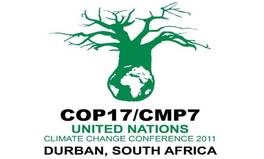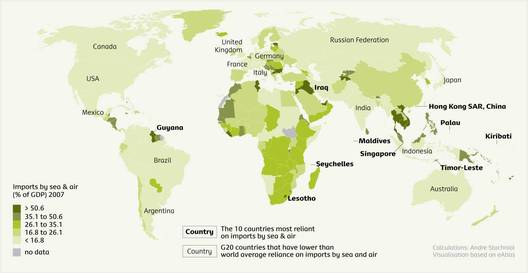- Home
- Case for Action
- IMFUND
- Solution - 3rd generation
- Buy-in
- AGF
- Achievements
- Awards
- Negotiations
- Bali 2007
- Bangkok 2009
- Barcelona 2009
- Bonn 2008
- Bonn 2009
- Bonn 2011
- Bonn 2013
- Brussels 2008
- Cancun 2010
- Copenhagen 2009
- Doha 2012
- Durban 2011
- Geneva 2009
- Lima 2014
- London 2008
- London 2009
- London 2010; 1
- London 2010; 2
- London 2011
- London 2012; 1
- London 2012; 2
- London 2013
- Montreal 2013
- Panama 2011
- Paris Goals 2016
- Poznan 2008
- In limbo ...
- Presentations
- Historical
- Search
- About
COP 17 & climate finance
 There was no material progress on addressing emissions from international aviation and maritime transport at the United Nations Climate Change Conference COP 17 / CMP 7 at Durban. The Parties only agreed to continued consideration of issues related to these emissions, and there was no direct reference to innovative financing arising from international transport (but compromise options were proposed ...).
There was no material progress on addressing emissions from international aviation and maritime transport at the United Nations Climate Change Conference COP 17 / CMP 7 at Durban. The Parties only agreed to continued consideration of issues related to these emissions, and there was no direct reference to innovative financing arising from international transport (but compromise options were proposed ...).
At the same time, arguably, significant progress was made in Durban through the agreement to negotiate a global deal applicable to all countries!
- The key outcomes of the Conference include the agreements on:
- a second commitment period under the Kyoto Protocol
 ;
;
- a process to develop and adopt a universal legal agreement on climate change
 as soon as possible, but not later than 2015;
as soon as possible, but not later than 2015;
- the establishment of the Green Climate Fund
 ;
;
- the establishment of a work programme on long-term finance in 2012
 to identify funding sources (as one of many decisions related to the outcome of the AWG-LCA; for instance the continued consideration of emissions from international aviation and maritime transport is decided in paragraphs 74 and 78 of the text
to identify funding sources (as one of many decisions related to the outcome of the AWG-LCA; for instance the continued consideration of emissions from international aviation and maritime transport is decided in paragraphs 74 and 78 of the text  ).
).
The negotiations at Durban on both the cooperative sectoral approaches (that includes emissions from international transport) and long-term financing were once again difficult. The biggest issues were with the general framework for the cooperative sectoral approaches, as in this item the Parties had the most diverging and least flexible views.
Increased awareness of innovative financing
However, an increased awareness of benefits of a global carbon pricing of international shipping with compensation for less developed countries was seen in certain discussions (with compensation potentially limited to certain countries, and potentially applicable to aviation as well).
A final amalgamation of draft texts in preparation of the outcome to be presented to the high-level segment included seven options for international aviation and shipping (see document CRP.38 of December 7
Negotiators from some countries maintained their oppositions to such proposals either by questioning that impact/incidence of such a carbon price may be potentially greater than calculated or by justifying the opposition on process ground; according to them sources of long-term finance should be discussed under a future work-programme (now agreed to take place in 2012), and thus the financing details were too specific.
Outlook for 2012
When the outcomes of Durban are considered in the context of economic circumstances including the large sovereign debt of various developed countries, an increased interest is likely during 2012 in sources of innovative financing such as carbon pricing.
Given the compelling economic analysis for imposing a carbon price on international transport provided to the G20 Finance Ministers by the IMF and World Bank (in the Report on Mobilizing Climate Finance
However, the progress is not guaranteed and the complexities of the issues involved cannot be underestimated, including the need for an equitable approach for the less developed countries (see below).
No negative impacts on less developed countries
It is widely recognized that a key condition for a political acceptance of a global carbon price on international maritime transport (and aviation) is that such a mechanism does not have negative impacts on less developed countries that are least responsible for climate change.
A recent analysis published by CAFOD made this argument even stronger. It showed that - without any compensation for its impacts - carbon pricing of international shipping would be regressive, as it would impose larger cost burden relative to GDP on many poorer countries that rely heavily on imports by sea and air (see/follow a map below). This includes some small island developing states (SIDS) and least developed countries (LDCs).
For details see a short Summary of Fair Finance ![]() (includes a map) and/or the full briefing paper entitled Fair Finance: Ensuring developing countries benefit from carbon pricing of international transport
(includes a map) and/or the full briefing paper entitled Fair Finance: Ensuring developing countries benefit from carbon pricing of international transport ![]() (7 MB).
(7 MB).
For our RM proposal to ensure no adverse impacts on less developed countries (also referred to as "no net incidence"), see the Rebate Mechanism or a short summary with selected data for SIDS ![]() .
.
Given our discussions with representatives from over 30 countries at Durban, we are cautiously optimistic regarding further progress on an equitable carbon pricing mechanism for international transport in 2012 (especially in shipping).

